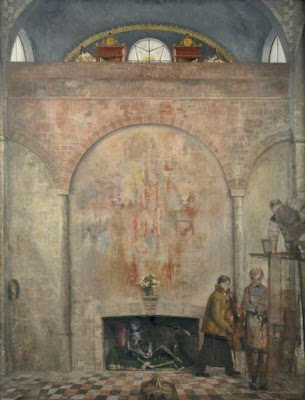A Winter Night
It was a chilly winter's night;
And frost was glitt'ring on the ground,
And evening stars were twinkling bright;
And from the gloomy plain around
Came no sound,
But where, within the wood-girt tower,
The churchbell slowly struck the hour;
As if that all of human birth
Had risen to the final day,
And soaring from the worn-out earth
Were called in hurry and dismay,
Far away;
And I alone of all mankind
Were left in loneliness behind.
William Barnes, Poems, Partly of Rural Life, in National English (1846).
Utagawa Hiroshige (1797-1858), "Snow Falling on a Town"
However, we ought not to get too carried away with these dark-of-night contemplations. An apostrophe on the "metaphysical" or "existential" loneliness of humanity in a mute and empty cosmos would be barren and abstract. Rather, a clear winter night -- starry, vast, and eternally cold -- is simply a salutary reminder of how puny each of us is. That's it. Well, yes, loneliness does enter into it. But it is the homely, small-scale, and individual soul-loneliness that we all experience on a daily basis. "When the night-processions flit/Through the mind." That sort of thing. With a sharper, chillier edge.
The Hounds
Far off a lonely hound
Telling his loneliness all round
To the dark woods, dark hills, and darker sea;
And, answering, the sound
Of that yet lonelier sea-hound
Telling his loneliness to the solitary stars.
Hearing, the kennelled hound
Some neighbourhood and comfort found,
And slept beneath the comfortless high stars.
But that wild sea-hound
Unkennelled, called all night all round --
The unneighboured and uncomforted cold sea.
John Freeman, Stone Trees and Other Poems (Selwyn and Blount 1916).
I can sometimes hear sea lions barking in the night down along the shores of Puget Sound. Are they "telling [their] loneliness all round" or "to the solitary stars"? I find their voices to be comforting.
Harald Sohlberg, "Winter Night in the Mountains" (1918-1924)
When it comes to the silence and the emptiness of the universe, R. S. Thomas is the poet to go to. Thomas's life-long waiting and waiting for a single whisper from something out there -- God, of course -- is perhaps the key theme of his poetry. An odd thing to say of someone who was an Anglican priest, isn't it? Did he ever hear the whisper? I don't know. But his waiting and listening led to the creation of a great many beautiful poems.
The Other
There are nights that are so still
that I can hear the small owl calling
far off and a fox barking
miles away. It is then that I lie
in the lean hours awake listening
to the swell born somewhere in the Atlantic
rising and falling, rising and falling
wave on wave on the long shore
by the village, that is without light
and companionless. And the thought comes
of that other being who is awake, too,
letting our prayers break on him,
not like this for a few hours,
but for days, years, for eternity.
R. S. Thomas, Destinations (Celandine Press 1985).
Utagawa Hiroshige, "Uraga in Sagami Province"
Now, having just said that R. S. Thomas "is the poet to go to" when it comes to the silence and the emptiness of the universe, what am I to do with Robert Frost? An amendment is in order: R. S. Thomas and Robert Frost are the poets to go to when it comes to the silence and the emptiness of the universe.
I've never had the sense that Frost is waiting upon God, however. His intimate knowledge of silence and emptiness -- the universe's and his own -- is wholly personal. Or so it seems to me. "Acquainted with the Night." This acquaintance is not necessarily comforting. "Harrowing" is the word that comes to mind.
Desert Places
Snow falling and night falling fast, oh, fast
In a field I looked into going past,
And the ground almost covered smooth in snow,
But a few weeds and stubble showing last.
The woods around it have it -- it is theirs.
All animals are smothered in their lairs.
I am too absent-spirited to count;
The loneliness includes me unawares.
And lonely as it is that loneliness
Will be more lonely ere it will be less --
A blanker whiteness of benighted snow
With no expression, nothing to express.
They cannot scare me with their empty spaces
Between stars -- on stars where no human race is.
I have it in me so much nearer home
To scare myself with my own desert places.
Robert Frost, A Further Range (Henry Holt 1936).
Harald Sohlberg, "Winter Night in the Mountains" (1911-1914)









































